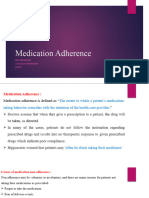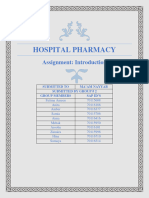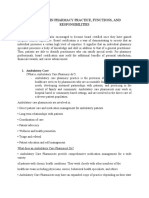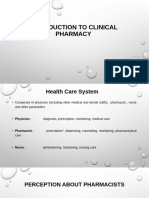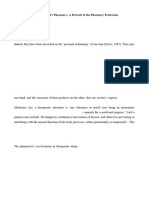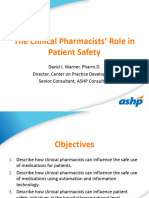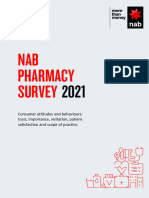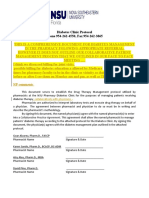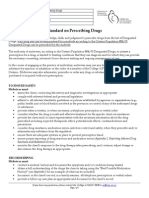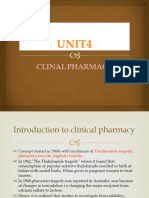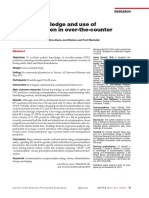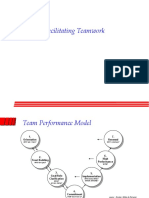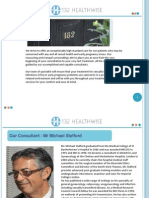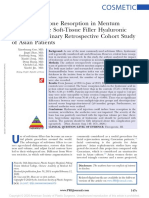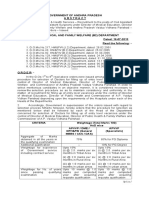Day in The Life of A Pharmacist PDF
Day in The Life of A Pharmacist PDF
Uploaded by
joanne_rawksCopyright:
Available Formats
Day in The Life of A Pharmacist PDF
Day in The Life of A Pharmacist PDF
Uploaded by
joanne_rawksOriginal Description:
Original Title
Copyright
Available Formats
Share this document
Did you find this document useful?
Is this content inappropriate?
Copyright:
Available Formats
Day in The Life of A Pharmacist PDF
Day in The Life of A Pharmacist PDF
Uploaded by
joanne_rawksCopyright:
Available Formats
Day in the life of a Hospital Pharmacist The prescribing of medication is the most common healthcare intervention for a patient,
and is normally the main course of treatment for the vast majority. In the average general hospital, 97% of patients will be taking medicines. Medicines account for 5% of the total NHS expenditure which is approximately 11 billion per annum and ABMs expenditure on medicines is about 160 million per year. Hospital pharmacists are experts in the field of medicines and provide a wide range of services which can be classified as: Technical Purchasing, storage, manufacture, dispensing, quality testing and supply of all the medicines used in the hospital Clinical - The pharmacist is an integral part of the healthcare team where the focus is firmly on patients They work on a daily basis with doctors, nurses and other members of multidisciplinary teams to advise on the selection of medicine, the dose and route of administration for individual patients, such as tablet, injection, ointment or inhaler They provide information about potential side effects and ensure that new treatments are compatible with existing medication and monitor the effects of treatment to ensure that it is safe and effective. Specialist advice is provided for patients who should not take certain medications, for example patients with conditions such as heart failure, kidney or liver disease and for pregnant or breast feeding women. For inpatients, pharmacists carry out daily ward rounds to check the drug charts of each patient. If a patient is new to the ward, the pharmacist will need to check their notes to see why they have been admitted, and to gain more information about the patients medical history and what medication they are taking. This involves close co-operation with GP surgeries and primary care pharmacy teams. The pharmacist will then work with individual patients to help select the most appropriate therapy, taking account of factors including their existing medication, medical history, lifestyle and ability to understand and follow a treatment plan. Picture: Alison Williams, Pharmacist at Neath Port Talbot Hospital, checks a patients drug chart as part of her daily rounds
Once a patient is ready to be discharged, any medication they need to take home has to be checked by the pharmacist. The patient is then counselled to make sure they are aware of what they have been prescribed and the instructions they need to follow. Pharmacists also help transfer the information from patients drug charts into an electronic version which is then sent to the patients GP. This improves medicine reconciliation between primary and secondary care, stops medicines being continued or discontinued inadvertently and allows surgeries to update computer medication history in a timely fashion. Outpatients seen in clinics across the hospital also use the services of the pharmacist. If a patient is given a prescription during their appointment, they then take it to the pharmacy where they will check it is correct and supervise dispensing of the medication. Certain specialist drugs, for example cancer therapies or medication that requires active on-going monitoring and drugs prescribed only by specialist medical staff, make up the majority of these prescriptions. Pharmacist Alison Williams has been a member of the department at Neath Port Talbot Hospital for the past five years: I absolutely love my job. You are able to liaise with so many people as we all work as a multi disciplinary team. The job is busy, and teaches you to prioritise. Its challenging and stimulating, and you are always learning something new, especially on the wards. I also really enjoy the patient contact, it provides an opportunity for patients to learn more about their medication, as they are able to ask us about any aspect of their therapy they have been prescribed. The face to face contact helps to reinforce the advice, and make patients feel more confident. As well as providing advice on the wards for patients, Alison is part of a multidisciplinary team that delivers pulmonary rehabilitation sessions in Neath Port Talbot Community Resource Centre for patients with chronic chest conditions. Alison gives a regular presentation on the medications to treat these conditions. Many of the therapies used come in specialist inhaler devices and patients are assessed for the most suitable drug and device and Alison has also qualified as an independent prescriber in this field. Additionally she is able to answer patients questions about other medication that they are taking for related or different conditions. Pharmacists at Neath Port Talbot Hospital provide a monitoring clinic for patients taking medication which thins the blood. Pharmacists adjust dosages for patients based on a blood test reading, taking into account the reason for treatment, current medication, advancement of condition and diet. The clinic holds around 2000 appointments per month and provides an instant blood test result, which enables the patient and pharmacist to discuss the results face to face.
Picture: Paul Swithenbank, Lead Clinical Pharmacist at Neath Port Talbot Hospital, advising a patient about his warfarin medication Pharmacists also work in a medicines information department where, using a range of reference sources, they provide detailed information to healthcare professionals about any aspect of medicines usage. Pharmacists are involved in the manufacture of medicines when ready made preparations are not available. The licensed unit at Neath Port Talbot Hospital provides over 300,000 items per year both internally and externally. Specialist cancer treatments and intravenous nutrition are prepared on the Singleton and Morriston sites. These are tailor made under sterile conditions for individual patients and preparation requires a high degree of training, manipulation and skill. Specialised roles in other areas such as procurement, radiotherapy, quality assurance and education and training also exist.
You might also like
- College Essays That Made A Difference by The Princeton Review ExcerptDocument31 pagesCollege Essays That Made A Difference by The Princeton Review Excerptjoanne_rawksNo ratings yet
- Experiential Pharmacy Practice in Institutional Pharmacy: Module 1: Part 2Document27 pagesExperiential Pharmacy Practice in Institutional Pharmacy: Module 1: Part 2levi pinedaNo ratings yet
- Clinical PharmacyDocument38 pagesClinical PharmacyBalakrishna Thalamanchi100% (2)
- The Role of A Hospital Pharmacist: Medicine ManagementDocument6 pagesThe Role of A Hospital Pharmacist: Medicine Managementsubhankar pradhan100% (1)
- Standard Operating Procedures For Pharmaceutical Care Delivery in Health FacilitiesDocument7 pagesStandard Operating Procedures For Pharmaceutical Care Delivery in Health FacilitiesNhu0% (1)
- Unit 1. Clinical PharmacyDocument5 pagesUnit 1. Clinical PharmacyAashish BhattaraiNo ratings yet
- Frontline PharmacistDocument5 pagesFrontline PharmacistYet Barreda BasbasNo ratings yet
- Finish Application Selection CriteriaDocument2 pagesFinish Application Selection Criteriaapi-322710565No ratings yet
- Contemporary PharmacyDocument10 pagesContemporary PharmacyGerald Limo Arap ChebiiNo ratings yet
- Ward Round ParticipationDocument4 pagesWard Round ParticipationJdjfdjjdNo ratings yet
- Clinical PharmacistDocument2 pagesClinical PharmacistArif Ali RphNo ratings yet
- DR - Khan Clinical Pharmacy OrientationDocument55 pagesDR - Khan Clinical Pharmacy OrientationIram CHNo ratings yet
- Helping Patients Make The Most of Their MedicinesDocument13 pagesHelping Patients Make The Most of Their MedicinesArif ShikalgarNo ratings yet
- Scope of Clinical PharmacyDocument13 pagesScope of Clinical PharmacykeerthanaNo ratings yet
- Outpatient Pharmacy: Course Name: Hospital Training Course Code: PHD311 Date: 22 October 2020Document37 pagesOutpatient Pharmacy: Course Name: Hospital Training Course Code: PHD311 Date: 22 October 2020honeylemon.coNo ratings yet
- Buletin Farmasi 11/2013Document10 pagesBuletin Farmasi 11/2013afiq83No ratings yet
- Medication AdheranceDocument26 pagesMedication AdheranceboyapallymeghanaNo ratings yet
- An Unconventional Pharmacy That Gets Results - Bringing Integrative Medicine To The PharmacyDocument3 pagesAn Unconventional Pharmacy That Gets Results - Bringing Integrative Medicine To The PharmacyImma OlayanNo ratings yet
- What Is Clinical PharmacyDocument4 pagesWhat Is Clinical PharmacySethiSheikhNo ratings yet
- Fatima (Group Assignment)Document37 pagesFatima (Group Assignment)Anita AkbarNo ratings yet
- Central University of Applied Sciences, Department of PharmacyDocument10 pagesCentral University of Applied Sciences, Department of PharmacyBoas WayneNo ratings yet
- Pharmacy Practice ReportDocument22 pagesPharmacy Practice Report31.Rutuja KakadeNo ratings yet
- Ihcs FinalsDocument2 pagesIhcs FinalsQuenneeNo ratings yet
- Who Are The PharmacistsDocument3 pagesWho Are The PharmacistsMilena RozoNo ratings yet
- Clinical Pharmacist Bridging Dr-Pasien PDFDocument3 pagesClinical Pharmacist Bridging Dr-Pasien PDFEdi Uchiha SutarmantoNo ratings yet
- 10 Svensberg2020 Article PatientsPerceptionsOfMedicinesDocument10 pages10 Svensberg2020 Article PatientsPerceptionsOfMedicinesmehakNo ratings yet
- Specialties in Pharmacy PracticeDocument9 pagesSpecialties in Pharmacy PracticeKRIZELLE MAGANANo ratings yet
- Role of PharmacistDocument40 pagesRole of PharmacistJESHEL MARABENo ratings yet
- Introduction To Clinical PharmacyDocument40 pagesIntroduction To Clinical Pharmacy2020-fst-024No ratings yet
- GROUP 4 - Interdisciplinary CareDocument21 pagesGROUP 4 - Interdisciplinary CareCLARISSA GRACE GERALDINONo ratings yet
- National Patient Safety GoalsDocument7 pagesNational Patient Safety GoalsyaniNo ratings yet
- Clinical Pharmacy Services in A Pediatric ERDocument4 pagesClinical Pharmacy Services in A Pediatric ERMuhammad Ibraheem AhmadNo ratings yet
- Er20-25t Hospital & Clinical PharmacyDocument71 pagesEr20-25t Hospital & Clinical Pharmacydhoomkeetu1No ratings yet
- Compendia 2Document24 pagesCompendia 2zaynab.20903008No ratings yet
- Chapter 1 Hospital and Clinical Pharmacy Choplete PDF Notes D.Pharma 2nd Notes PDF NoteskartsDocument7 pagesChapter 1 Hospital and Clinical Pharmacy Choplete PDF Notes D.Pharma 2nd Notes PDF NoteskartsDrx Brajendra Lodhi100% (1)
- State of Worlds PharmacyDocument19 pagesState of Worlds Pharmacymadougtraore23No ratings yet
- 1588574819students Industrial WorkDocument16 pages1588574819students Industrial WorkAdekunle AkintanNo ratings yet
- The Health Team and The Zambian Health SystemDocument49 pagesThe Health Team and The Zambian Health Systemnoahngoma41No ratings yet
- Hospital PharmacyDocument14 pagesHospital PharmacyAbigael PescasioNo ratings yet
- David Warner Plenary1Document64 pagesDavid Warner Plenary1almangaNo ratings yet
- Clinical PharmacyDocument16 pagesClinical Pharmacyfike50% (2)
- Ambulatory Care Appe Rotation ManualDocument28 pagesAmbulatory Care Appe Rotation Manualapi-457513377100% (2)
- Interview Q 7Document8 pagesInterview Q 7shaymaalhNo ratings yet
- NAB Pharmacy Report 2021Document42 pagesNAB Pharmacy Report 2021marjoriegloduve02No ratings yet
- BarnsteinerJ MRDocument14 pagesBarnsteinerJ MRLuciana OliveiraNo ratings yet
- 3B - Clinical PharmacyDocument35 pages3B - Clinical PharmacyekramNo ratings yet
- 3B - Clinical PharmacyDocument35 pages3B - Clinical PharmacyekramNo ratings yet
- 1-29-20 Diabetes Protocol Draft With Pandya and Alvarez EditsDocument12 pages1-29-20 Diabetes Protocol Draft With Pandya and Alvarez Editsapi-552486649No ratings yet
- S C111910 PrescribingDrugs Council Nov192010Document7 pagesS C111910 PrescribingDrugs Council Nov192010Ilham Maulana HerdiansyahNo ratings yet
- Healthcare Wellness Eldercare Pharmacist in Spring Valley NY Resume Yolene PierreDocument2 pagesHealthcare Wellness Eldercare Pharmacist in Spring Valley NY Resume Yolene PierreYolenePierreNo ratings yet
- Clinical Pharmacy - A Definition: Fahad Hussain 9/20/2010Document4 pagesClinical Pharmacy - A Definition: Fahad Hussain 9/20/2010Tawhida Islam100% (1)
- Community 2Document5 pagesCommunity 2Adia MasooraNo ratings yet
- UNIT4 Clinical PharmacyDocument21 pagesUNIT4 Clinical PharmacyIsha AgarwalNo ratings yet
- Farmasi RSDocument7 pagesFarmasi RSDesyNo ratings yet
- PharmacistDocument2 pagesPharmacistkunalprabhu148No ratings yet
- 2013 Introduction of Clinical PharmacyDocument18 pages2013 Introduction of Clinical Pharmacyyudi50% (2)
- Polypharmacy in Older People - A Guide For Healthcare ProfessionalsDocument44 pagesPolypharmacy in Older People - A Guide For Healthcare ProfessionalsDaniel RamírezNo ratings yet
- Conversion Gate02Document6 pagesConversion Gate02CognizerNo ratings yet
- Patient Knowledge and Use of Acetaminophen in Over-The-Counter MedicationsDocument8 pagesPatient Knowledge and Use of Acetaminophen in Over-The-Counter MedicationsRehan AliNo ratings yet
- Your Guide To A Career in Pharmacy A Comprehensive OverviewFrom EverandYour Guide To A Career in Pharmacy A Comprehensive OverviewNo ratings yet
- Essential Pharmacology For Inpatient CareFrom EverandEssential Pharmacology For Inpatient CareRating: 4.5 out of 5 stars4.5/5 (7)
- 1-2 What Is Forensic Science v1Document23 pages1-2 What Is Forensic Science v1Alexandre LaraNo ratings yet
- Exam 2 Fall 2005Document4 pagesExam 2 Fall 2005joanne_rawksNo ratings yet
- Basic Guitar Chords PDFDocument4 pagesBasic Guitar Chords PDFSamNo ratings yet
- Apparent Motions of Celestial Objects1Document15 pagesApparent Motions of Celestial Objects1joanne_rawksNo ratings yet
- Vegan Burger Menu PDFDocument2 pagesVegan Burger Menu PDFjoanne_rawksNo ratings yet
- Aug 15 2009Document1 pageAug 15 2009joanne_rawksNo ratings yet
- EP Vantage Big Pharma Becomes Smaller Employer As Biotech Booms 2014Document8 pagesEP Vantage Big Pharma Becomes Smaller Employer As Biotech Booms 2014Suraj SawadekarNo ratings yet
- Chemical Legislation in Malaysia: Purpose of AssessmentDocument8 pagesChemical Legislation in Malaysia: Purpose of AssessmentAwatifNo ratings yet
- Case Study 1Document2 pagesCase Study 1api-265054719No ratings yet
- CHAPTER 2 LectureDocument5 pagesCHAPTER 2 LectureChristian Josh EspedillonNo ratings yet
- OnlineEC Instruction MDMS 2022 23Document2 pagesOnlineEC Instruction MDMS 2022 23pavi7muruganathanNo ratings yet
- Team Performance ModelDocument17 pagesTeam Performance ModelAdewumi Samson Segun100% (1)
- Lemongrass As An Alternative Pest Controle1Document8 pagesLemongrass As An Alternative Pest Controle1RENANTE DESEONo ratings yet
- Upper Respiratory Tract Infection (Farter Bu'RaraDocument58 pagesUpper Respiratory Tract Infection (Farter Bu'RaraFajrul Fhalaq BasoNo ratings yet
- Atlas of Interventional Orthopedics ProceduresDocument659 pagesAtlas of Interventional Orthopedics ProceduressalvadordelacruzalvarezNo ratings yet
- 132 HealthwiseDocument9 pages132 Healthwisemichael.staffordNo ratings yet
- Journal Reading: Hepatitis A: Epidemiology and Prevention in Developing CountriesDocument12 pagesJournal Reading: Hepatitis A: Epidemiology and Prevention in Developing CountriesDyah ArdaniNo ratings yet
- Material Safety Data Sheet: Poly Aluminium ChlorideDocument4 pagesMaterial Safety Data Sheet: Poly Aluminium ChlorideKusmianti DeoraNo ratings yet
- Nigerian Auto ReportDocument37 pagesNigerian Auto Reportnikhu_shuklaNo ratings yet
- Kebersihan Tangan, APD, Peralatan Pasien, Dan Linen 16-2-2023 - CompressedDocument70 pagesKebersihan Tangan, APD, Peralatan Pasien, Dan Linen 16-2-2023 - CompressedSaripa TalaohuNo ratings yet
- Biodiesel Plant EIA SummaryDocument13 pagesBiodiesel Plant EIA SummaryAnonymous DJrec2No ratings yet
- Unexpected Bone Resorption in Mentum ASIAN PATIENTSDocument9 pagesUnexpected Bone Resorption in Mentum ASIAN PATIENTSletty3gape100% (1)
- Material Safety Data Sheet: 1. Product and Company IdentificationDocument9 pagesMaterial Safety Data Sheet: 1. Product and Company IdentificationAdeNo ratings yet
- BCA Classes of BuildingDocument1 pageBCA Classes of BuildingTamo TalasasaNo ratings yet
- My Technical Seminar PPT (Bionic Eyes)Document26 pagesMy Technical Seminar PPT (Bionic Eyes)kitty100% (1)
- Sporozoa 4Document27 pagesSporozoa 4ebenezermanzanormtNo ratings yet
- 2013HMF MS105Document2 pages2013HMF MS105DrRam Jadhav LakavathNo ratings yet
- Resume After Changes Kunas SavannahDocument5 pagesResume After Changes Kunas Savannahapi-689621377No ratings yet
- Slide Present Green CityDocument18 pagesSlide Present Green CityEbulArh0% (2)
- Multi-Column Water Tank Construction Specifications Tank Contractor: Phoenix Fabricators and Erectors, LLCDocument8 pagesMulti-Column Water Tank Construction Specifications Tank Contractor: Phoenix Fabricators and Erectors, LLCJorge León IllanesNo ratings yet
- IMSHealth WhitePaper Top20 2015Document21 pagesIMSHealth WhitePaper Top20 2015eldhersanNo ratings yet
- Autism - The Real Cause and A Proven SolutionDocument21 pagesAutism - The Real Cause and A Proven SolutionSoon Tze Chien100% (1)
- The Essentials of Forensic Medicine and Toxicology Narayan ReddyDocument33 pagesThe Essentials of Forensic Medicine and Toxicology Narayan Reddysowjip20No ratings yet
- A2 Reading Test 1Document8 pagesA2 Reading Test 1Mariana RuizNo ratings yet
- JadaDocument14 pagesJadaadambear213No ratings yet
- Edward Jay Wang, William Li, Doug Hawkins, Terry Gernsheimer, Colette Norby-Slycord, Shwetak N. PatelDocument12 pagesEdward Jay Wang, William Li, Doug Hawkins, Terry Gernsheimer, Colette Norby-Slycord, Shwetak N. PatelPavithra SivanathanNo ratings yet
















